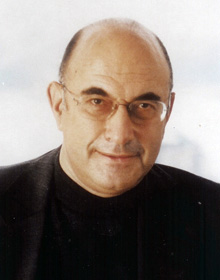Elkhonon Goldberg
Article about Elkhonon Goldberg, a neuropsychologist
Elkhonon Goldberg[edit]

Elkhonon Goldberg is a prominent neuropsychologist and cognitive neuroscientist known for his work on the frontal lobes and hemispheric specialization. He has contributed significantly to the understanding of executive functions and the neuropsychology of the brain.
Biography[edit]
Elkhonon Goldberg was born in the Soviet Union and later moved to the United States. He studied under the renowned neuropsychologist Alexander Luria, which greatly influenced his work. Goldberg has held academic positions at various institutions and has been involved in both research and clinical practice.
Research[edit]
Goldberg's research has focused on the frontal lobes of the brain, which are crucial for executive functions such as decision making, problem solving, and planning. He has explored the concept of hemispheric specialization, proposing that the right hemisphere is more involved in novel situations, while the left hemisphere is more engaged in routine tasks.
Frontal Lobes[edit]
The frontal lobes are a key area of interest in Goldberg's work. He has studied their role in executive functions and how they contribute to cognitive control. His research has helped elucidate the complex processes involved in goal-directed behavior and self-regulation.
Hemispheric Specialization[edit]
Goldberg has proposed theories on hemispheric specialization, suggesting that the right hemisphere is more adept at handling new and unfamiliar tasks, while the left hemisphere is more efficient in dealing with familiar and routine activities. This theory has implications for understanding brain lateralization and cognitive development.
Publications[edit]
Goldberg has authored several influential books and articles on neuropsychology and cognitive neuroscience. His works include "The Executive Brain: Frontal Lobes and the Civilized Mind" and "The Wisdom Paradox: How Your Mind Can Grow Stronger As Your Brain Grows Older," which explore the intricacies of the brain and cognition.
Teaching and Influence[edit]
As a professor, Goldberg has taught numerous students in the fields of neuropsychology and cognitive neuroscience. His teachings emphasize the importance of understanding the brain's structure and function in relation to behavior and cognition.
Related pages[edit]
Ad. Transform your life with W8MD's Budget GLP-1 injections from $75


W8MD offers a medical weight loss program to lose weight in Philadelphia. Our physician-supervised medical weight loss provides:
- Weight loss injections in NYC (generic and brand names):
- Zepbound / Mounjaro, Wegovy / Ozempic, Saxenda
- Most insurances accepted or discounted self-pay rates. We will obtain insurance prior authorizations if needed.
- Generic GLP1 weight loss injections from $75 for the starting dose.
- Also offer prescription weight loss medications including Phentermine, Qsymia, Diethylpropion, Contrave etc.
NYC weight loss doctor appointmentsNYC weight loss doctor appointments
Start your NYC weight loss journey today at our NYC medical weight loss and Philadelphia medical weight loss clinics.
- Call 718-946-5500 to lose weight in NYC or for medical weight loss in Philadelphia 215-676-2334.
- Tags:NYC medical weight loss, Philadelphia lose weight Zepbound NYC, Budget GLP1 weight loss injections, Wegovy Philadelphia, Wegovy NYC, Philadelphia medical weight loss, Brookly weight loss and Wegovy NYC
|
WikiMD's Wellness Encyclopedia |
| Let Food Be Thy Medicine Medicine Thy Food - Hippocrates |
Medical Disclaimer: WikiMD is not a substitute for professional medical advice. The information on WikiMD is provided as an information resource only, may be incorrect, outdated or misleading, and is not to be used or relied on for any diagnostic or treatment purposes. Please consult your health care provider before making any healthcare decisions or for guidance about a specific medical condition. WikiMD expressly disclaims responsibility, and shall have no liability, for any damages, loss, injury, or liability whatsoever suffered as a result of your reliance on the information contained in this site. By visiting this site you agree to the foregoing terms and conditions, which may from time to time be changed or supplemented by WikiMD. If you do not agree to the foregoing terms and conditions, you should not enter or use this site. See full disclaimer.
Credits:Most images are courtesy of Wikimedia commons, and templates, categories Wikipedia, licensed under CC BY SA or similar.
Translate this page: - East Asian
中文,
日本,
한국어,
South Asian
हिन्दी,
தமிழ்,
తెలుగు,
Urdu,
ಕನ್ನಡ,
Southeast Asian
Indonesian,
Vietnamese,
Thai,
မြန်မာဘာသာ,
বাংলা
European
español,
Deutsch,
français,
Greek,
português do Brasil,
polski,
română,
русский,
Nederlands,
norsk,
svenska,
suomi,
Italian
Middle Eastern & African
عربى,
Turkish,
Persian,
Hebrew,
Afrikaans,
isiZulu,
Kiswahili,
Other
Bulgarian,
Hungarian,
Czech,
Swedish,
മലയാളം,
मराठी,
ਪੰਜਾਬੀ,
ગુજરાતી,
Portuguese,
Ukrainian